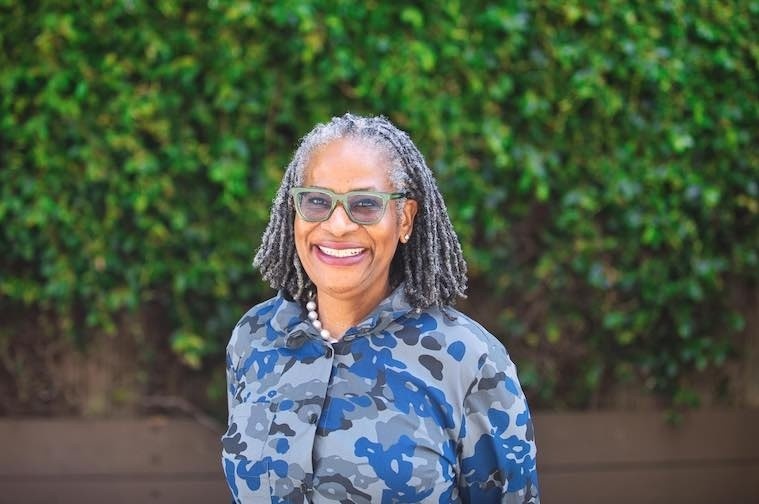Global talent, proud advocate
2024-04-16 • Ginger O'Donnell

Carrie Johnson sees education as a ‘game changer for all.’ (Photo: Max Morse)
Throughout her multifaceted career in architecture and design, Carrie Johnson, AB ’89 (architecture), has used her talents to help lead global companies. Most recently, she is applying the tools of design to address equity issues affecting low-income and minority communities in Baltimore. The Sam Fox School of Design & Visual Arts alumna credits her success in part to her parents, her education and the university’s robust alumni network.
The recipient of a full-tuition merit scholarship at WashU, Johnson knew from day one that she wanted to pay the generosity forward for others. In 2020, after years of hard work and professional growth, she endowed the Etta Green Johnson Scholarship in memory of her mother. She’s also served as a member of the Sam Fox School’s national council and through additional advisory roles. And in July 2023, she joined Washington University’s Board of Trustees.
Johnson also serves as a co-chair of Make Way: Our Student Initiative, a fundraising effort launched in October 2022 that seeks to remove financial barriers for qualified students and enhance the student experience. Here, she speaks from the heart about the influence of her WashU education — both on campus and after graduation — and acting as an ambassador for Make Way.
How did you choose architecture and WashU?
My mother was a social activist. She would bring me along to different neighborhoods in Montgomery County, Maryland, and Washington, D.C., while volunteering for a fair housing organization. I was struck by the differences in design in lower- income areas, and it really bothered me that homes were arranged differently depending on the ZIP code. I believe that good design can exist at every socioeconomic level. Driven by what I saw, I decided at age 8 that I wanted to become an architect.
My mother also helped me find my path to WashU. She took me to a college fair in Maryland, where I happened by the WashU table. When I learned that the university offered both architecture and Mandarin Chinese, I was hooked. I wanted to double major, but I ended up putting down Mandarin after one year to focus on architecture. It’s still a dream of mine to become fluent.
What do you value most about your WashU education?
The relationships I built at WashU have been an integral part of my life since I stepped on campus in 1985, and they continue to guide me. Throughout my career, I have been able to pivot at crucial junctures to expand my craft and expertise. The biggest pivot took me from a New York architecture firm, Handel Architects, to the Estée Lauder Cos. I can tie it all back to inter-actions at WashU alumni events.
For instance, I met fellow architecture graduate Risa Honig at one such event. She had worked at the Gap Inc. group and pivoted to serve in a New York City government entity. I told her how much I love the construction administration phase of architecture. She referred me to a recruiter for retailers, and that connection opened up my world. I got a job as project manager of store construction at Estée Lauder. The experience eventually helped me land a position at Apple, where I stayed for a decade: seven years implementing the design, development and standards of retail stores around the globe followed by three years on Apple’s corporate construction team executing the bespoke, highly innovative Foster + Partners-designed Apple Park campus.
What does Make Way mean to you?
Being onstage at the Make Way launch event last fall, I was immensely proud for my parents. They’ve passed, but my role with the initiative would be deeply meaningful to them. In chatting with young people at the event, I also realized how important it is for me to step out and be visible, to show students that we people of color occupy leadership roles.
I have even more pride in the university now. Wearing my WashU swag, I start conversations with total strangers and promote my alma mater and its commitment to students. I love that the phrase “Make Way” implies a sense of engagement for every student coming in and every alum going forward: “Make way because I’m here. I’m somebody.” WashU wants to support you, whatever your background.
Donors who provide funding for scholarships make way for outstanding young people to come to WashU. The knowledge and skills they gain while here continue to open doors for them after graduation. With this level of support, students can follow their internal compass and their deepest passions. This greatly enhances their impact on our world. In this way, I believe education is a game changer for all.